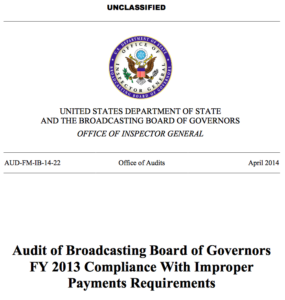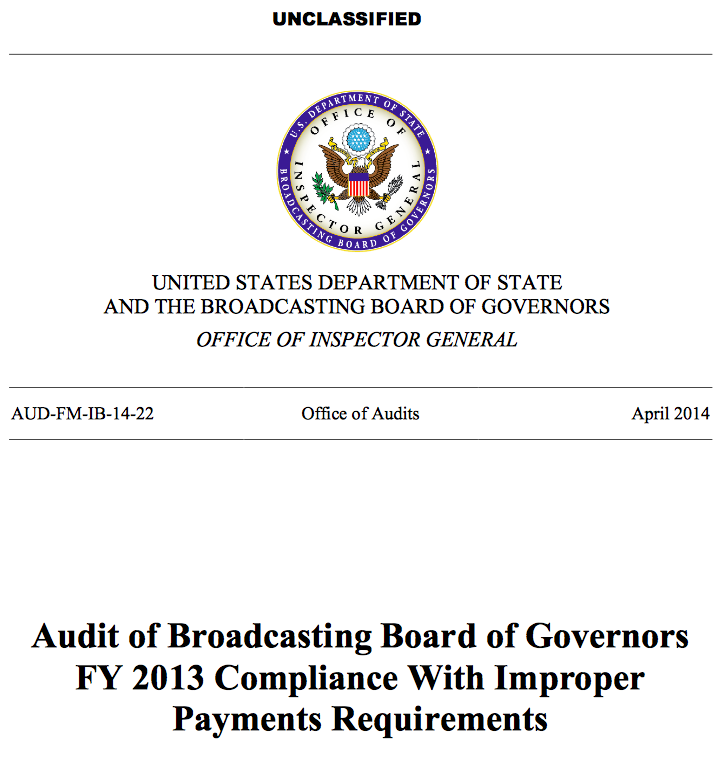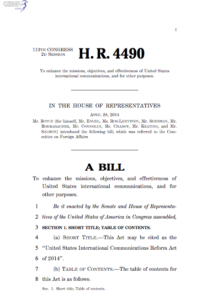BBG Watch Commentary — Investigative Report — Waste and Mismanagement
In a series of investigative reports, BBG Watch will focus on waste and mismanagement at the Voice of America and the International Broadcasting Bureau — two federal entities of the Broadcasting Board of Governors.
Voice of America wasted estimated millions on improper contract payments, Radio Free Asia gets clean bill of health
 Yet another Office of Inspector General (OIG) investigation shows that while Voice of America (VOA), the International Broadcasting Bureau (IBB) and the Office of Cuba Broadcasting (OCB) — all three within the federal structure of the Broadcasting Board of Governors (BBG) — are mismanaged and waste taxpayers’ money on improper payments to contractors, BBG’s semi-private grantee media outlets, such as Radio Free Asia (RFA), Radio Free Europe / Radio Liberty (RFE/RL) and Middle East Broadcasting Networks (MBN), which receive far less money than VOA and IBB, are better managed and spend federal money wisely.
Yet another Office of Inspector General (OIG) investigation shows that while Voice of America (VOA), the International Broadcasting Bureau (IBB) and the Office of Cuba Broadcasting (OCB) — all three within the federal structure of the Broadcasting Board of Governors (BBG) — are mismanaged and waste taxpayers’ money on improper payments to contractors, BBG’s semi-private grantee media outlets, such as Radio Free Asia (RFA), Radio Free Europe / Radio Liberty (RFE/RL) and Middle East Broadcasting Networks (MBN), which receive far less money than VOA and IBB, are better managed and spend federal money wisely.
The highest projected improper payments of $7.8 million (15.7 percent) were made by the poorly managed Voice of America.
A major reason for a bipartisan bill, unanimously adopted by the House Foreign Affairs Committee last week for consideration to the full House and the Senate, HR 4490, The United States International Communications Reform Act, is to reform management of the International Broadcasting Bureau, the Voice of America, and the Office of Cuba Broadcasting and to prevent the spread of mismanagement from these federal entities to RFE/RL, RFA, and MBN by removing them completely from any federal IBB administrative influence.
The total potential improper payment exposure for the Voice of America, the International Broadcasting Bureau (IBB), and the Office of Cuba Broadcasting (OCB) was $9,282,629. OIG concluded that if the deficiencies at the Voice of America are not addressed, “BBG will be required to identify VOA as a program susceptible to improper payments, which would trigger additional corrective actions and reporting.”
The BBG board, under its new reform-minded chairman Jeff Shell, has replaced some of the key executives at the International Broadcasting Bureau but has not yet conducted a management reform at VOA. Under the current legislative set-up, the BBG board cannot make personnel decisions other than replacing heads of main BBG entities. The Shell board put in a new three-person management team at IBB after the IBB director retired late last year. No such change has occurred at VOA.
The Office of Inspector General at the U.S. Department of State conducted an audit to determine whether the Broadcasting Board of Governors (BBG) was in compliance with the Improper Payments Information Act of 2002 (IPIA), as amended by the Improper Payments Elimination and Recovery Act of 2010 (IPERA).
OIG found that BBG’s improper payments risk assessment identified high improper payment error rates at the International Broadcasting Bureau and the Voice of America, “including a 15.7 percent error rate and a potential $7.8 million in improper payments for one program (Voice of America).” “The high error rates occurred primarily because of insufficient or incomplete supporting documentation,” OIG concluded.
OIG found that BBG was in substantial compliance with IPIA requirements by conducting an improper payments risk assessment of its programs and made the required improper payments disclosures in its FY 2013 Performance and Accountability Report (PAR).
Although BBG complied with IPIA requirements, OIG found that BBG’s improper payments risk assessment identified high improper payment error rates, including a 15.7 percent error rate and a potential $7.8 million in improper payments for one program. The high error rates occurred primarily because of insufficient or incomplete supporting documentation. These documentation deficiencies prevented BBG from verifying that payments were proper. In addition, BBG did not notify OMB and OIG of its decision not to perform payment recapture audits and provide the analysis used by BBG to reach this decision, as required. BBG planned to make the notifications after it updated the process and risk analysis documentation used to supportitscost-benefit analysis. Without the proper notifications,OMB and OIG could not independently assess and validate BBG’s determination that payment recapture audits would not be a cost-effective method for identifying and recapturing improper payments.
Improper payments occurred at the Voice of America, the International Broadcasting Bureau and the Office of Cuba Broadcasting — all of them federal entities within the Broadcasting Board of Governors.
Radio Free Asia — a non-federal, semi-private media outlet within BBG, received a clean bill of health from the OIG audit. No improper payments were found at Radio Free Asia. Other, non-federal BBG entities, Radio Free Europe / Radio Liberty and Middle East Broadcasting Networks, are also believed to be much better managed than VOA, IBB, and OCB. RFE/RL and MBN, however, were not part of this audit.
OIG reported in its audit that a BBG contractor “performed quantitative testing of four higher risk programs: RFA, VOA, IBB, and OCB. To perform the quantitative analysis, the contractor tested a statistical sample of expenditures made during FY 2012 for RFA, VOA, and IBB and expenditures made during the first three quarters of FY2013 for OCB. As detailed below in Table 1, the contractor tested 486 payments in total, less than 1 percent, ofthe 255,456 payments made for the four programs, but these payments amounted to approximately $48.7 million, or 38 percent of the approximate $129 million in payments.”
Based upon improper payment estimates prepared by BBG’s contractor, BBG identified projected improper payments of $7.8 million (15.7 percent), $1.1 million (4.3 percent), and $382,629 (4.1 percent) for VOA, IBB, and OCB, respectively. This information was reported in BBGs FY 2013 PAR.
OIG report makes the following observation about management practices at the Voice of America:
“In addition, VOA’s improper payment error rate of 15.7 percent was significantly above OMB’s 2.5 percent threshold, and the projected improper payments of $7.8 million, although below the $10 million threshold, were significant enough to be of concern. If the deficiencies in payment documentation are not addressed and estimated improper payments increase, BBG will be required to identify VOA as a program susceptible to improper payments, which would trigger additional corrective actions and reporting under IPIA.”
Improper Use of Contract Employees by Voice of America Management
Other potential legal violations and millions of dollars in potential liabilities were identified in another OIG report and an IRS audit, largely due to high level of contracting activity by the Voice of America.
The OIG’s September 2013 preliminary report concluded that the Agency’s use of Purchase Order Vendors violates a prohibition in the Federal Acquisition Regulations against hiring “personal services contractors” without statutory authorization.
Contractors, known as Purchase Order Vendors (POVs) and Personal Services Contractors (PSCs) represent a substantial portion — 35% — of BBG’s current workforce. Expenditures for contractors total approximately $36 million on an annual basis — roughly 70% of the Voice of America’s annual general operating expenditures (independent of salary funds). The Voice of America relies on approximately 660 contractors to support program production in 45 language services, the English Central News function, and in technical capacities for broadcast Operations. In most circumstances, these contractors are performing the same mission critical work as federal employees. The majority of VOA’s contractors work 40 hours a week, and some, roughly 15%, have contracted with BBG for 5 years or more.
The Internal Revenue Service (IRS) concluded in its 2010 tax audit of BBG’s use of POV that the Agency should have treated its POVs as employees for tax reporting purposes, including withholding income and Social Security taxes from POVs.
Read more: Government media board facing inquiry over hiring protocol, Jim McElhatton, The Washington Times, May 3, 2014.
Also read: OIG alleges massive Anti-Deficiency Act violations by IBB officials, BBG Watch, February 10, 2014.
BBG Watch is planning a series of investigative reports on improper use and administration of POV contracts by the Voice of America and the International Broadcasting Bureau. Please check our website for updates.
Audit of Broadcasting Board of Governors FY 2013 Compliance With Improper Payments Requirements
UNITED STATES DEPARTMENT OF STATE AND THE BROADCASTING BOARD OF GOVERNORS
OFFICE OF INSPECTOR GENERAL
A bipartisan bill, introduced by U.S. Rep. Ed Royce (R-CA), Chairman of the House Foreign Relations Committee, and U.S. Rep. Eliot Engel (D-NY), its Ranking Democratic Member, and unanimously adopted by the House Foreign Affairs Committee last week for consideration by the full House and the Senate, HR 4490, The United States International Communications Reform Act, states:
“(11) According to the Office of the Inspector General, the BBG’s Office of Contracts is not in compliance with the Federal Acquisition Regulation, lacks appropriate contract oversight, and violates the Anti-Deficiency Act. The Office of the Inspector General also determined that the Broadcasting Board of Governors has not adequately performed full and open competitions or price determinations, has entered into hundreds of personal service con- tracts without statutory authority, and contractors regularly work without valid contracts in place.
(12) The size and make-up of the BBG work- force should be closely examined, given the agency’s broader broadcasting and technical mission, as well as changing media technologies.
(13) The BBG should be structured to ensure that more taxpayer dollars are dedicated to the sub- stantive, broadcasting, and information-related ele- ments of the agency’s mission.
(14) The lack of a coherent and well defined mission of the Voice of America has led to program- ming that duplicates the efforts of the Office of Cuba Broadcasting, Radio Free Asia, RFE/RL, In- corporated, and the Middle East Broadcasting Net- work that results in inefficient use of tax-payer funding.
(15) The annual survey conducted by the ‘‘Partnership for Public Service’’ consistently ranks the Broadcasting Board of Governors at or near the bottom of all Federal agencies in terms of ‘‘overall best places to work’’ and ‘‘the extent to which employees feel their skills and talents are used effec- tively.’’. The consistency of these low scores point to structural, cultural, and functional problems at the Broadcasting Board of Governors.”



Comments are closed.